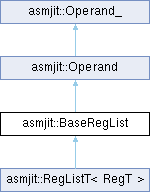asmjit::BaseRegList Class Reference [¶]

List of physical registers (base).
Note
List of registers is only used by some ARM instructions at the moment.

List of physical registers (base).
List of registers is only used by some ARM instructions at the moment.
Creates a dummy register operand.
Creates a new register operand which is the same as other .
Creates a new register operand compatible with other, but with a different id.
Creates a register initialized to the given signature and id.
Tests whether the register-list is valid, which means it has a type and at least a single register in the list.
Tests whether the register type matches type - same as is_reg(type), provided for convenience.
Tests whether the register group matches group.
Tests whether the register is a general purpose register (any size).
Tests whether the register is a vector register.
Returns the size of a single register in this register-list or 0 if unspecified.
Returns the register list as a mask, where each bit represents one physical register.
Remoes all registers from the register-list by making the underlying register-mask zero.
Adds registers passed by a register mask to the register-list.
Removes registers passed by a register mask to the register-list.
Uses AND operator to combine the current register-list with other register mask.
Uses XOR operator to combine the current register-list with other register mask.
Checks whether a physical register phys_id is in the register-list.
Adds a physical register phys_id to the register-list.
Removes a physical register phys_id from the register-list.
Clones the register-list operand.